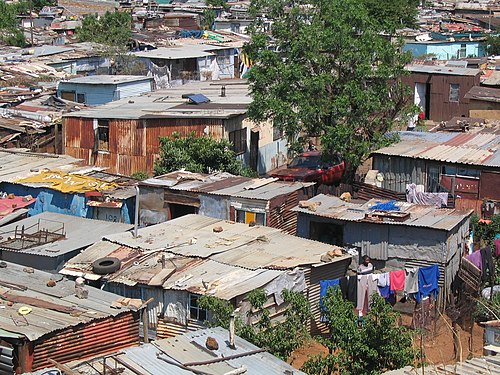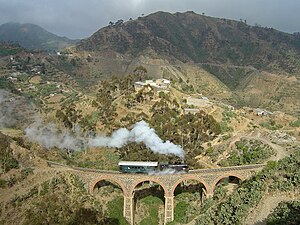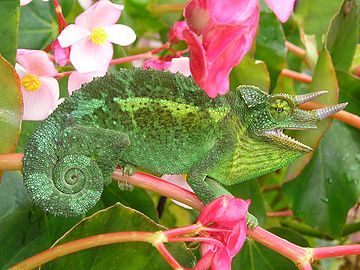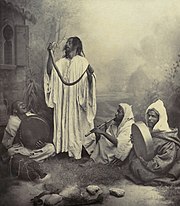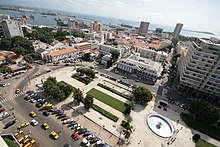Portal:Africa



Africa is the world's second-largest and second-most populous continent after Asia. At about 30.3 million km2 (11.7 million square miles) including adjacent islands, it covers 20% of Earth's land area and 6% of its total surface area. With nearly 1.4 billion people as of 2021, it accounts for about 18% of the world's human population. Africa's population is the youngest among all the continents; the median age in 2012 was 19.7, when the worldwide median age was 30.4. Based on 2024 projections, Africa's population will reach 3.8 billion people by 2099. Africa is the least wealthy inhabited continent per capita and second-least wealthy by total wealth, ahead of Oceania. Scholars have attributed this to different factors including geography, climate, corruption, colonialism, the Cold War, and neocolonialism. Despite this low concentration of wealth, recent economic expansion and a large and young population make Africa an important economic market in the broader global context. Africa has a large quantity of natural resources and food resources, including diamonds, sugar, salt, gold, iron, cobalt, uranium, copper, bauxite, silver, petroleum, natural gas, cocoa beans, and.
Africa straddles the equator and the prime meridian. It is the only continent to stretch from the northern temperate to the southern temperate zones. The majority of the continent and its countries are in the Northern Hemisphere, with a substantial portion and a number of countries in the Southern Hemisphere. Most of the continent lies in the tropics, except for a large part of Western Sahara, Algeria, Libya and Egypt, the northern tip of Mauritania, and the entire territories of Morocco and Tunisia, which in turn are located above the tropic of Cancer, in the northern temperate zone. In the other extreme of the continent, southern Namibia, southern Botswana, great parts of South Africa, the entire territories of Lesotho and Eswatini and the southern tips of Mozambique and Madagascar are located below the tropic of Capricorn, in the southern temperate zone.
Africa is highly biodiverse; it is the continent with the largest number of megafauna species, as it was least affected by the extinction of the Pleistocene megafauna. However, Africa is also heavily affected by a wide range of environmental issues, including desertification, deforestation, water scarcity, and pollution. These entrenched environmental concerns are expected to worsen as climate change impacts Africa. The UN Intergovernmental Panel on Climate Change has identified Africa as the continent most vulnerable to climate change.
The history of Africa is long, complex, and varied, and has often been under-appreciated by the global historical community. In African societies the oral word is revered, and they have generally recorded their history via oral tradition, which has led anthropologists to term them oral civilisations, contrasted with literate civilisations which pride the written word. During the colonial period, oral sources were deprecated by European historians, which gave them the impression Africa had no recorded history. African historiography became organized at the academic level in the mid-20th century, and saw a movement towards utilising oral sources in a multidisciplinary approach, culminating in the General History of Africa, edited by specialists from across the continent. (Full article...)
Selected article –

The Dahomey Amazons (Fon: Agojie, Agoji, Mino, or Minon) were a Fon all-female military regiment of the Kingdom of Dahomey (in today's Benin, West Africa) that existed from the 17th century until the late 19th century. They were the only female army in modern history. They were named Amazons by Western Europeans who encountered them, due to the story of the female warriors of Amazons in Greek mythology.
The emergence of an all-female military regiment was the result of Dahomey's male population facing high casualties in the increasingly frequent violence and warfare with neighbouring West African states. This led to Dahomey being one of the leading states in the slave trade with the Oyo Empire, which used slaves for commodity exchange in West Africa until the slave trade in the region ended. The lack of men likely led the kings of Dahomey to recruit women into the army. The formation of a female-only army unit was a retaliation and maneuver around the forced tribute of male slaves to Oyo each year. (Full article...)
Featured pictures –
Did you know (auto-generated) -

- ... that goalkeeper Sophie Whitehouse, who has lived in England, Africa and the US, has been chosen to play soccer for the Republic of Ireland?
- ... that young male African bush elephants in musth killed about 49 white rhinoceros
- ... that Saint Augustine died during the Vandal conquest of Roman Africa?
- ... that American Olympic rugby player Sarah Levy is the great-granddaughter of a Springbok?
- ... that Ruth L. Bennett provided shelter for more than 2,000 black women and girls who migrated north to Chester, Pennsylvania, as part of the Great Migration?
- ... that the pulse stops during the soliloquy of In C Mali?
Categories
Selected biography –
Jason Sendwe (1917 – 19 June 1964) was a Congolese politician and the founder and leader of the General Association of the Baluba of the Katanga (BALUBAKAT) party. He later served as Second Deputy Prime Minister of the Democratic Republic of the Congo (then Republic of the Congo) from August 1961 until January 1963, and as President of the Province of North Katanga from September 1963 until his death, with a brief interruption.
Sendwe was born in 1917 in Mwanya, Kabongo Territory, Belgian Congo, to an ethnic Baluba family. He was educated in Methodist schools and nursing institutions. Unable to become a doctor due to a lack of medical schools in the Congo, he found work as a minister, teacher, and nurse. He became involved in several cultural organisations, and in 1957 founded BALUBAKAT to fight for the interests of the Baluba. He espoused Congolese nationalism and believed that the Congo should remain a united country after Belgian rule. In May 1960, shortly before the country's independence, he was elected to the newly constituted Chamber of Deputies. Sendwe sought to obtain control over the government of Katanga Province, but lost to a power struggle against his rival, Moïse Tshombe, and the Confederation of Tribal Associations of Katanga (CONAKAT) party. Regardless, Prime Minister Patrice Lumumba nominated him for the office of State Commissioner for Katanga. (Full article...)
Selected country –
 |
 |
||

| |||
Uganda, formally the Republic of Uganda, is a landlocked country in East Africa, bordered on the east by Kenya, on the north by Sudan, on the west by the Democratic Republic of the Congo, on the southwest by Rwanda, and on the south by Tanzania. The southern part of the country includes a substantial portion of Lake Victoria, within which it shares borders with Kenya and Tanzania. The country is located on the East African plateau, averaging about 900 metres (2,950 ft) above sea level. Uganda takes its name from the Buganda kingdom, which encompasses a portion of the south of the country including the capital Kampala.
The President of Uganda, currently Yoweri Museveni, is both head of state and head of government. The president appoints a prime minister who aids him in his tasks. The current prime minister is Apolo Nsibambi. The parliament is formed by the National Assembly, which has 303 members. Eighty-six of these members are nominated by interest groups, including women and the army. The remaining members are elected for five-year terms during general elections. (Read more...)
Selected city –
Dakar (/dɑːˈkɑːr, dæ-/ UK also: /ˈdækɑːr/; French: [dakaʁ]; Wolof: Ndakaaru) is the capital and largest city of Senegal. The department of Dakar has a population of 1,278,469, and the population of the Dakar metropolitan area was at 4.0 million in 2023.
Dakar is situated on the Cap-Vert peninsula, the westernmost point of mainland Africa. Cap-Vert was colonized by the Portuguese in the early 15th century. The Portuguese established a presence on the island of Gorée off the coast of Cap-Vert and used it as a base for the Atlantic slave trade. France took over the island in 1677. Following the abolition of the slave trade and French annexation of the mainland area in the 19th century, Dakar grew into a major regional port and a major city of the French colonial empire. In 1902, Dakar replaced Saint-Louis as the capital of French West Africa. From 1959 to 1960, Dakar was the capital of the short-lived Mali Federation. In 1960, it became the capital of the independent Republic of Senegal. Dakar will host the 2026 Summer Youth Olympics. (Full article...)
In the news
- 13 February 2025 – War against the Islamic State
- More than thirty ISIS-Somalia fighters are killed in airstrikes on positions in the Sheebaab area of the Cal Miskaad mountains in northern Bari Region, Puntland, Somalia. (Hiiraan Online) (Anadolu Agency)
- 12 February 2025 – Sudanese civil war
- Darfur campaign
- The Rapid Support Forces storm the Zamzam Refugee Camp in North Darfur, Sudan, the country's largest displacement camp. The situation inside the camp, which holds around 500,000 people, is described as "catastrophic", with an unknown number of casualties. (BBC News)
- 12 February 2025 – Russia–Sudan relations
- Sudanese foreign minister Ali Yousif Sharif reports that an agreement has been reached for the creation of a Russian naval base in Sudan. (Al Arabiya)
- 11 February 2025 – Kivu conflict
- Rwandan-backed M23 rebel forces initiate advances towards Bukavu, the capital of South Kivu in the eastern Democratic Republic of the Congo (DRC), following a two-day unilateral ceasefire. (Al Jazeera)
- 11 February 2025 – War against the Islamic State
- At least 27 Puntland soldiers and more than 70 ISIL militants are killed or wounded in fighting around the Togga Jacel area of the Cal Miskaad mountains in Puntland’s Bari Region. This is the deadliest attack since Puntland launched an offensive in December 2024 against Islamic State in Somalia hiding in the Golis Mountains. (VOA) (Reuters) (Garowe Online)
Updated: 21:05, 13 February 2025
General images -
Africa topics
More did you know –
- ...that Iyabo Obasanjo-Bello, a Nigerian Senator from the People's Democratic Party, is the daughter of former President Olusegun Obasanjo?
- ...that the 2007 South Africa miners' strike, which impacted over 240,000 workers, was the first ever industry-wide miners' strike in the history of South Africa?
- ...that Seleh Leha, a town in Tigray Region in northern Ethiopia, was the site of a leprosarium built during the Italian occupation of East Africa and abandoned in 1941?
- ...that Sarir field, an oil field in Cyrenaica operated by the Arabian Gulf Oil Company (AGOCO), is considered to be the largest in Libya, with estimated oil reserves of 12 Gbbl (1.9×109 m3)?
Related portals
Major Religions in Africa
North Africa
West Africa
Central Africa
East Africa
Southern Africa
Associated Wikimedia
The following Wikimedia Foundation sister projects provide more on this subject:
-
Commons
Free media repository -
Wikibooks
Free textbooks and manuals -
Wikidata
Free knowledge base -
Wikinews
Free-content news -
Wikiquote
Collection of quotations -
Wikisource
Free-content library -
Wikispecies
Directory of species -
Wikiversity
Free learning tools -
Wikivoyage
Free travel guide -
Wiktionary
Dictionary and thesaurus




